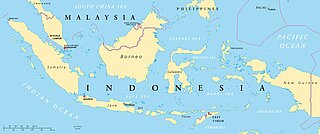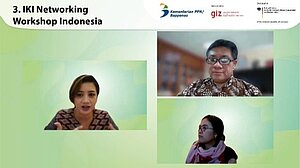Progressing low carbon development - IKI Networking Workshop in Indonesia

A series of workshops strengthens the cooperation between IKI and the Indonesian government.
On 20 and 21 October, the International Climate Initiative (IKI) interface project “Strengthening Climate Governance for Implementing the Paris Agreement in Indonesia” in cooperation with BAPPENAS conducted the 3. IKI Networking Workshop.
These series of workshops, provide a platform to facilitate knowledge exchange and cooperation between IKI and the Indonesian government as well as networking between the IKI-funded projects implemented in Indonesia.
On the first day, representatives of the Indonesian government, the German Ministry of the Environment and the German Embassy gave an overview of low-carbon development in Indonesia, the importance of biodiversity in the country and the German-Indonesian cooperation. The effects of the Corona Pandemic were also discussed.
The second day brought together representatives from IKI projects conducting activities in Indonesia. During a parallel thematic group session, participants joined one of the six break-out groups, namely climate mitigation policy and transparency; climate change adaptation; energy; transport as well as agriculture, forestry and other land use and biodiversity east and west.
Key outcomes of this session are thematic or sector specific posters that provide an overview about the contribution of the IKI portfolio to Indonesia´s climate and biodiversity related targets. Besides, the projects exchanged about Covid-19 related activities as well as requirements to increase future collaboration.
Click the links on the right side to learn more about the IKI projects in Indonesia.
The workshop in detail – insights into the opening speeches
The virtual workshop was opened by Dr. Arifin Rudiyanto, Deputy Minister for Maritime and Natural Resources Affairs of the Ministry of National Development Planning (BAPPENAS) and by Mr. Thomas Graf, Chargé d’Affaires a.i., Embassy of the Federal Republic of Germany in Indonesia.

Dr. Rudiyanto acknowledged the strategic role of the German Federal Ministry for the Environment, Nature Conservation and Nuclear Safety (BMU) in accelerating the progress of Indonesia´s low carbon development and pointed out that “with only ten years to prevent global warming from exceeding 1.5°C and to achieve the UN Sustainable Development Goals, we recognize that the government cannot work alone and needs to collaborate with multi-stakeholders, including development partners.”
Dr. Philipp Behrens, Head of Division International Climate Initiative at BMU highlighted the importance of the partner country Indonesia since it is a mega-biodiverse country, highly vulnerability to the effects of climate change and a mayor emerging economy. He introduced the participants to IKI and its funding mechanisms and shared on the IKI Corona Response Package that provided 29 ongoing projects in 25 countries with an additional funding of 68 million Euro.
This was followed by a talk show at which Ir. Medrilzam, Director for Environment, Bappenas, Yulia Suryanti, Deputy Director for Monitoring of Climate Change Mitigation, Nining Ngudi Purnamaningtyas, Head of Sub Directorate Implementation of International Conventions (KLHK) and Dr. Ir. Hariyanto, Director for Energy Conservation, provided first-hand information about the status of low carbon development and biodiversity during the pandemic.
Mr. Medrilzam, shared insights about Indonesia´s Mid-term National Development Plan 2020-2024 being the first development plan that includes low carbon development targets such as a GHG emission reduction goal of 27.3% compared to business as usual. He further stated that BAPPENAS recently published a policy brief to inform the public about the impact of the pandemic on low carbon development. Due to financial shifts for immediate pandemic response measures, the budget for low carbon development was reduced by 0,7 billion USD compared to 2019. However, it is expected that with the help of major low carbon development projects starting in 2021, implementation will be back to full gear in 2022.
Ms. Suryanti, talked about the ongoing development of various national strategies to support the implementation of the country´s Nationally Determined Contribution (NDC) like the NDC Roadmap on Mitigation and on Adaptation. She shared that the updated NDC is currently being finalized. A vital question however, is how sector implementation can be ensured.
This was followed by Ms. Purnamaningtyas, who pointed out that the pandemic requires everyone to rethink and reconnect the need of people to nature and how nature provides services for a clean and healthy environment.
Tasked by the RPJMN 2020-2024, the Ministry of Environment and Forestry is working on the verification of 70 million ha of conservation area, engaged in the topic of genetic resources and has a closer look on how benefits can be shared fairly and equally. Mr. Hariyanto, announced the development of a presidential regulation that aims to attract investments for renewable energy (RE) installations in Indonesia. So far only 10 GW of the existing 420GW RE potential is used. Lack of funding, higher prices for RE and the need to import technology are still existing challenges.
The link has been copied to the clipboard
Contact
IKI Office
Zukunft – Umwelt – Gesellschaft (ZUG) gGmbH
Stresemannstraße 69-71
10963 Berlin
IKI in Indonesia
Here you can find some project examples:
ExploRE - Strategic exploration of economic mitigation potentials through renewables
Rehabilitation of degraded lands with native tree species in Kalimantan
Nature conservation concessions to protect tropical rainforest in Indonesia



